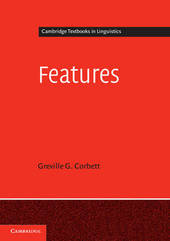
|
Features
Paperback / softback
Main Details
| Title |
Features
|
| Authors and Contributors |
By (author) Greville G. Corbett
|
| Series | Cambridge Textbooks in Linguistics |
|---|
| Physical Properties |
| Format:Paperback / softback | | Pages:338 | | Dimensions(mm): Height 245,Width 174 |
|
| Category/Genre | Grammar and syntax |
|---|
| ISBN/Barcode |
9781107661080
|
| Classifications | Dewey:415 |
|---|
| Audience | | Professional & Vocational | |
|---|
| Illustrations |
14 Tables, black and white; 5 Halftones, unspecified; 5 Line drawings, unspecified
|
|
Publishing Details |
| Publisher |
Cambridge University Press
|
| Imprint |
Cambridge University Press
|
| Publication Date |
11 October 2012 |
| Publication Country |
United Kingdom
|
Description
Features are a central concept in linguistic analysis. They are the basic building blocks of linguistic units, such as words. For many linguists they offer the most revealing way to explore the nature of language. Familiar features are Number (singular, plural, dual, ...), Person (1st, 2nd, 3rd) and Tense (present, past, ...). Features have a major role in contemporary linguistics, from the most abstract theorizing to the most applied computational applications, yet little is firmly established about their status. They are used, but are little discussed and poorly understood. In this unique work, Corbett brings together two lines of research: how features vary between languages and how they work. As a result, the book is of great value to the broad range of perspectives of those who are interested in language.
Author Biography
Greville G. Corbett is Distinguished Professor of Linguistics at the University of Surrey, where he leads the Surrey Morphology Group. His previous works on the typology of features include Gender (1991), Number (2000) and Agreement (2006).
Reviews'Grev Corbett's latest book, Features, is the capstone in a portal of masterpieces. Like its predecessors on specific topics like gender, number and agreement, it exhibits Corbett's unique blend of typological breadth, clarity and morphosyntactic acumen. But it goes beyond them to show how a properly developed theory of features can help linguists get beyond their current impasse - 'like chemists without a list of the elements, or physicists with no account of particles', as he puts it in his introduction - towards a point where morphosyntactic theory is supple and comprehensive enough to deal rigorously with the full panoply of the world's linguistic diversity. Every linguist will benefit deeply from reading this book from cover to cover.' Nicholas Evans, Australian National University 'Greville Corbett's astonishing linguistic erudition is deployed here in an indispensable, encyclopedic, theoretically thoughtful overview of a topic that linguists have too often treated in an ad hoc way. Corbett believes, correctly, that it is truly important that theoretical linguists should be clear on the facts about the range of features and values found in the languages of the world.' Geoffrey Pullum, University of Edinburgh
|